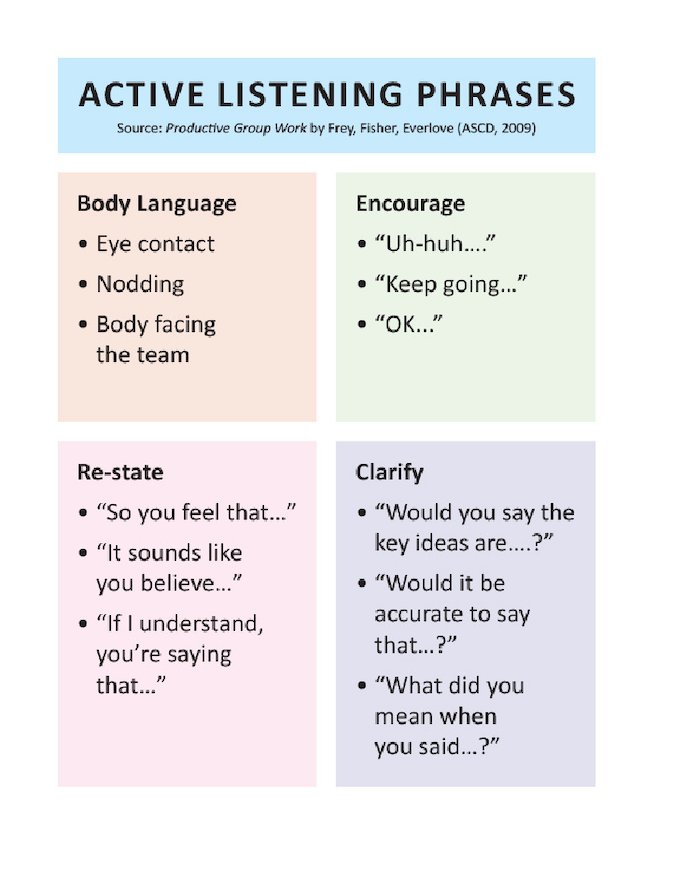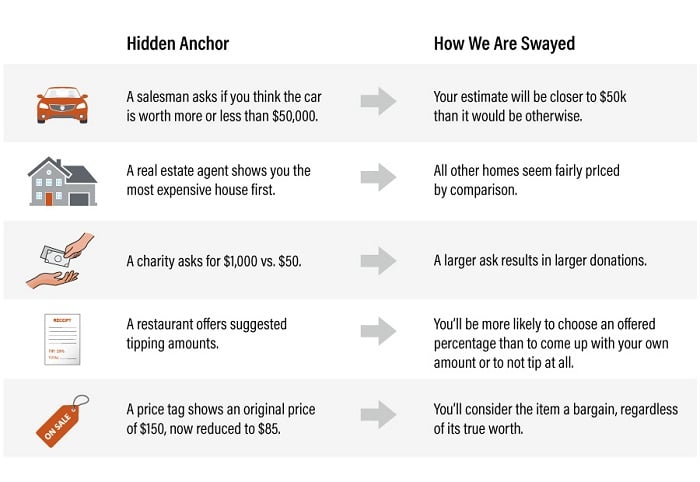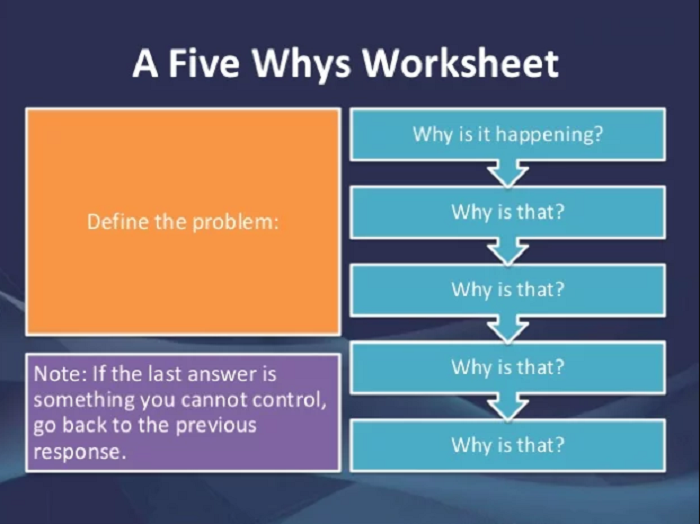Article URL: https://boards.greenhouse.io/finary/jobs/4031690004 Comments URL: https://news.ycombinator.com/item?id=28256269 Points: 1 # Comments: 0
Author: Richard Mitchell
8 Powerful Negotiation Tactics
What comes to mind when you think of negotiation tactics?
People in suits closing business deals?
Bargaining with a seller in a market?
Convincing your landlord to lower the rent?
How about all of these?
Negotiation Tactics Play a Key Role in Life
It’s tempting to think of negotiation only in terms of price, but the term represents many possibilities beyond money.
For example, if you’re struggling to negotiate your desired salary, you can negotiate the job benefits, the scope of work required, hours, or remote-work options.
In other areas of life, you can negotiate a better package with your regular service providers, you can negotiate better deals when shopping and you can even improve your relationships and expectations through effective negotiation.
What about business? Can negotiation tactics help you grow your business?
Research over the past few years says yes.
Whether you are an established CEO conducting high-profile meetings or a small independent seller collaborating with other business owners in your community, negotiation can significantly impact the rate of your growth.
Why Are Negotiation Tactics Important in Business?
Most business decisions can be improved by learning powerful negotiation tactics. Here’s a few reasons why learning to negotiate is important for growing your business.
- Improve Operations: Negotiation can help you find the right compensation package for your employees, get discounts from your manufacturers, have a successful fundraising round, and help you scale your business faster.
- Succession/Exit Plan: If you plan on selling your company eventually, negotiation can also help you find the right buyer at a great price.
- Improve Revenue: Done right, negotiation can help reduce business costs and increase profits. For example, negotiating better deals with suppliers or lower costs for rent.
- Business Relations: Negotiation can help you strike mutually beneficial deals that are not only profitable but also build positive long-term relationships.
- Life Satisfaction: You can also use negotiation in other areas of life like building healthy relationships or getting good deals on products and services. This will promote life satisfaction, creating an optimal mindset for success in your working life.
8 Negotiation Tactics to Become a Better Negotiator
Negotiation can offer great benefits, but it can also be challenging to enter a negotiation without effective negotiation tactics.
If you’re new to negotiations, worry not!
I have something for you.
Research over the years has found dozens of powerful negotiation tactics that can help you make better business decisions, land better opportunities, and successfully close important deals.
1. Listen More Than You Talk
I used to think a powerful negotiator knew all the right things to say. I believed negotiation was about who could outsmart the person in front.
I was wrong.
Successful negotiation is less about talking and more about listening.
When you listen without waiting for your turn to talk, you begin to truly understand what the other party wants. This can help you strike a “win-win” deal so you get what you want and they get what they want. Everyone goes home happy.
This practice of being present in a conversation and listening carefully is called active listening. It helps people feel heard and understood. This can help build a good rapport, which can turn into a good deal.
Here’s a helpful graphic that dives deeper into how you can practice active listening.

2. Use the Framing Method
Perception can have an interesting effect on how we see the world. Take, for example, the following image. It is often used to highlight how perceptions differ.
Do you see an old woman? Or a young one?

We interpret information differently depending on how it is presented to us. It’s a cognitive bias called the framing effect. You can use this knowledge to improve your negotiations.
For instance, consider this graphic from The Decision Lab:

You can see that “80% fat-free” sounds more appealing than “contains 20% fat,” even though it’s the same quantity.
This principle can easily be used as a negotiation tactic. To do this, frame your negotiations as a win-win opportunity.
For example, let’s say you want to make a deal for $30,000 but your client is set on $25,000. Now, instead of going back and forth over the price, try reframing what you have to offer.
Can you highlight the potential savings your client can enjoy by using your product? Can you address the risk of not using your services?
Ask yourself “How can I frame this solution so we both win?”
Keep in mind that you are not necessarily changing the end result. You are simply changing the way you frame the conversation.
3. Prepare for Compromise
Sometimes you can have the best negotiation tactics in your toolkit and still have to compromise. Many times, you will have to give something up to reach a mutual agreement.
This isn’t always a bad thing.
All relationships require some level of compromise.
You can’t entirely prevent it but you can prepare for it.
Negotiators who enter the room with a plan are often more successful than those who choose to “wing it.”
If you know you may have to compromise, why not be prepared for it?
In fact, having a plan B can actually put you in a stronger position.
To plan for what you can and can’t compromise, ask yourself, “What am I willing to give up for this opportunity/deal/product/relationship?”
Focus on what really matters, and don’t let minor details derail an otherwise good deal.
4. Rank Your Priorities
Another important part of planning your negotiation tactics is ranking your priorities.
There are things you absolutely need to have in order to enter a profitable agreement. Then, some things may be “good-to-have,” but aren’t a necessity.
Rank these so your priorities are clear to you.
If you must compromise on something, you need to decide what you can give up. This is where priority lists can help.
For example, building a good relationship with a client may be more important for you right now than making a big sale. In this situation, you can compromise on the price and earn the trust and goodwill of the other party.
5. Make the First Offer
You might have heard the adage “never show your cards.”
Many people believe you shouldn’t make the first offer and let the person in front “reveal” their number first.
This doesn’t work so well in real-life negotiations.
In fact, I’ve found, when it comes to negotiations, you should always be the first to say a number.
Why?
Remember, the starting number sets the tone for the rest of the negotiation. Being the first to state a number puts you in control of the negotiation process.
This practice is called anchoring.
Even if your number is extremely high or extremely low, now you can steer the negotiation conversation in the direction of your choice.
If your first number is very high, you have biased the negotiations to skew higher.
In most cases, this absurdly high number will be disregarded, but you are already angling for a higher price than if you came in much lower at a “reasonable” price.
Here are some examples of anchoring presented in a graphic by AMGfunds:

6. Identify the Real Issue
In some negotiations, the problem and the solution might be obvious. For example, when you negotiate a salary, both parties know you’re asking for more money in exchange for continuing to offer your services to the company.
Sometimes the real issues aren’t as obvious.
Let’s say you’ve lost interest in your current job, and need some free time to invest in a side hustle. You go to your boss and try negotiating more PTO or similar benefits.
You haven’t communicated your true needs, so your boss may not understand what you’re looking for. Maybe they’ll offer you a raise.
They think they’re doing the right thing, but both of you are stuck in an awkward situation because you couldn’t communicate your actual issue.
This often happens in negotiations. People negotiate for money when they really want more time, freedom, consistency, flexibility, or even another employee for support with the expected workload.
If the goal of a good negotiation process is to solve the problem, then communicating the real problem becomes a key aspect of negotiation tactics.
To succeed at negotiating, you need to understand what solution or outcome you’re seeking. This means you need to communicate the real problem—not just the most apparent one.
The Five Whys is a simple technique that will ensure you are addressing the root cause.
This graphic from Olivier Serrat will help you understand how to use it:

7. Offer a Win-Win Situation
As we discussed earlier, framing your negotiation as a win-win situation can help you become a powerful negotiator.
Here’s why a win-win situation matters.
- It helps both parties feel comfortable about the deal.
- It establishes mutual trust, respect, and a good rapport.
- It focuses on problem-solving, getting to the heart of the problem.
- It eliminates the winner-loser power dynamic.
- It opens up the possibility for working together again.
When we frame negotiations as a win-or-lose proposition, we automatically start with the assumption that someone has to lose.
(Hint: No one likes to lose.)
When you enter negotiations with a win-or-lose mindset, your goal is to convince the other party to accept defeat.
Instead, a powerful negotiator frames the negotiations as a win-win opportunity, so everyone is satisfied with the deal.
8. Be Willing to Walk Away
If you’ve framed the negotiation as a win-win opportunity, tried your best to compromise, discussed the underlying problems, and still failed to reach a mutually beneficial agreement, it may be time to walk away.
Many people are scared of having to walk away from a negotiation. This makes them more likely to take a bad deal rather than have no deal at all.
This is a counterproductive approach.
Being prepared to walk away will give you an advantage. It may not be what you hoped for when you entered the negotiation, but sometimes it’s better to say no than sign a bad contract.
If you’re comfortable walking away from the deal, you can use it as leverage. By having other options, you’re already in a stronger position—and now you’ve got a new level of experience to bring to your next round of negotiations with someone else.
Frequently Asked Questions About Negotiation Tactics
Don’t say things like “let’s make this quick,” or “what about my profit?” This can make the person in front feel like you care more about your personal gains than the relationship you share.
Active listening can be an important negotiation skill as it helps you truly understand what the other person has to say. This helps you make better, more empathetic offers that are more likely to be accepted.
Many people believe negotiation tactics are manipulative and unethical, but that’s not true. As long as you’re respectful of the other person’s needs and committed to offering a fair deal, negotiation is perfectly ethical.
Negotiation is a skill anyone can practice. Even if you’ve never negotiated in your life, working with a simple negotiation technique can help you increase your confidence and improve your ability over time.
Negotiation Tactics Conclusion
Negotiation tactics sound intimidating. Like they’re reserved for high-profile business people in suits.
That’s not true.
Anyone can negotiate almost any area of their life for better outcomes. From yearly raises to monthly rent, there’s scope for using these negotiation strategies everywhere.
Each of the negotiating tactics we discussed today is powerful alone, but together, their impact can be incredibly effective.
Try them, and you’ll see.
Which negotiation tactic will you try first?
Nuts And Bolts Of Residual Income
Nuts And Bolts Of Residual Income Recurring revenue is the crème de la crème of income. Musicians, such as authors or artists, recognize this kind of recurring earnings as an aristocracy. For those that are devoted visitors of the late evening paid announcements that so often promote their company chances where you can earn money … Continue reading Nuts And Bolts Of Residual Income
New comment by Tayla_Micromine in "Ask HN: Who is hiring? (October 2020)"
MICROMINE | Software Engineer | Perth, Western Australia |Full-Time | Onsite MICROMINE is a an established, growing, global company that creates cutting edge software solutions utilised by some of the world’s largest Mining companies. You will be working on a wide range of projects, extending the Micromine software suite by developing new and extending existing …
The post New comment by Tayla_Micromine in “Ask HN: Who is hiring? (October 2020)” first appeared on Online Web Store Site.
New comment by levimalott in "Ask HN: Who is hiring? (May 2020)"
Pachama | Senior Full-stack Software Engineer | REMOTE
Pachama’s mission is to solve climate change by restoring nature. Climate change requires us to remove carbon from the atmosphere. Forests are the way to do it. We use satellite imaging and machine learning to measure and monitor forests. Like-minded and top investors, such as Saltwater Capital, Chris Sacca, and Paul Graham, back us.
We are building the world‘s first verified forest carbon marketplace. We watch forests, track carbon offsets, and connect buyers to high-quality projects.
We need your help to bring transparency and to increase the use of forests to remove carbon.
We’re looking for a senior full-stack engineer to help build machine-learning services and data infrastructure. Our stack is Python, PostGIS, BigQuery, and React/Redux.
Apply at: https://jobs.lever.co/pachama/70f7cfc4-4d83-46c8-84ae-3f9c67…
Or by email: levi at pachama dot com
Cellular Phone Or Blackberry?
Cellular Phone Or Blackberry?
When thinking about whether to acquire a mobile phone or a blackberry, among one of the most essential functions to think about is cellular phone innovation. While blackberries still out do the typical mobile phone, mobile phone modern technology is quickly capturing up. With the mobile phone’s capability to message, download, immediate message, and also determine the pointer percent in a dining establishment, their modern technology is adequate for many people.
As well as while blackberry innovation proceeds to breakthrough, it is not proceeding at the exact same price as cell phones are. Cell phones have actually enhanced so a lot in their preferred requirement that the majority of technical production business are concentrating on the application of cell phone innovation.
With the improvements to mobile phone innovation that have actually currently happened, many people change their cellular phone every 12 to 18 months. Really couple of individuals hang on to their mobile phone for greater than 2 years. It is essential to cellular phone proprietors to stay on par with the most up to date innovation and also every little thing that a mobile phone can taking care of.
Blackberry substitute data recommend that the typical blackberry proprietor changes their devices every 24 to 48 months, therefore decreasing the repurchase worth. Much like any type of various other innovation tools on the marketplace, with higher appeal as well as equal innovation breakthroughs, the expense of the modern technology lowers also as the modern technology itself improves.
Lots of people pick cellular phone innovation as a result of its loved one convenience and also knowledge. Those that are not inclined to obtain delighted regarding brand-new innovation do not also recognize what a blackberry is, though almost every person understands what a cellular phone is as well as what you can do with one.
Cell phones are such a staple in our culture that also those that have alternative innovation still bring a cell phone. Cell phone modern technology isn’t that much behind the majority of various other mobile technical innovations. Cell phone innovation has actually progressed to the factor that many of us would certainly be shed without our cell phones.
When taking into consideration whether to buy a cell phone or a blackberry, one of the most essential functions to take into consideration is cell phone modern technology. While blackberries still out carry out the standard cell phone, cell phone modern technology is quickly capturing up. With the improvements to cell phone modern technology that have actually currently taken area, many individuals change their cell phones every 12 to 18 months. Cell phones are such a staple in our culture that also those that have alternating modern technology still bring a cell phone.
The post Cellular Phone Or Blackberry? appeared first on ROI Credit Builders.
Cambly (YC W14) is hiring. Solve a massıve problem for billions of people
Article URL: https://jobs.lever.co/cambly/?department=Product&team=Engineering
Comments URL: https://news.ycombinator.com/item?id=22321740
Points: 1
# Comments: 0
Second Measure seeks eng/sales to grow transaction data platform (San Mateo+NYC)
Article URL: https://secondmeasure.com/jobs/
Comments URL: https://news.ycombinator.com/item?id=21609217
Points: 1
# Comments: 0

